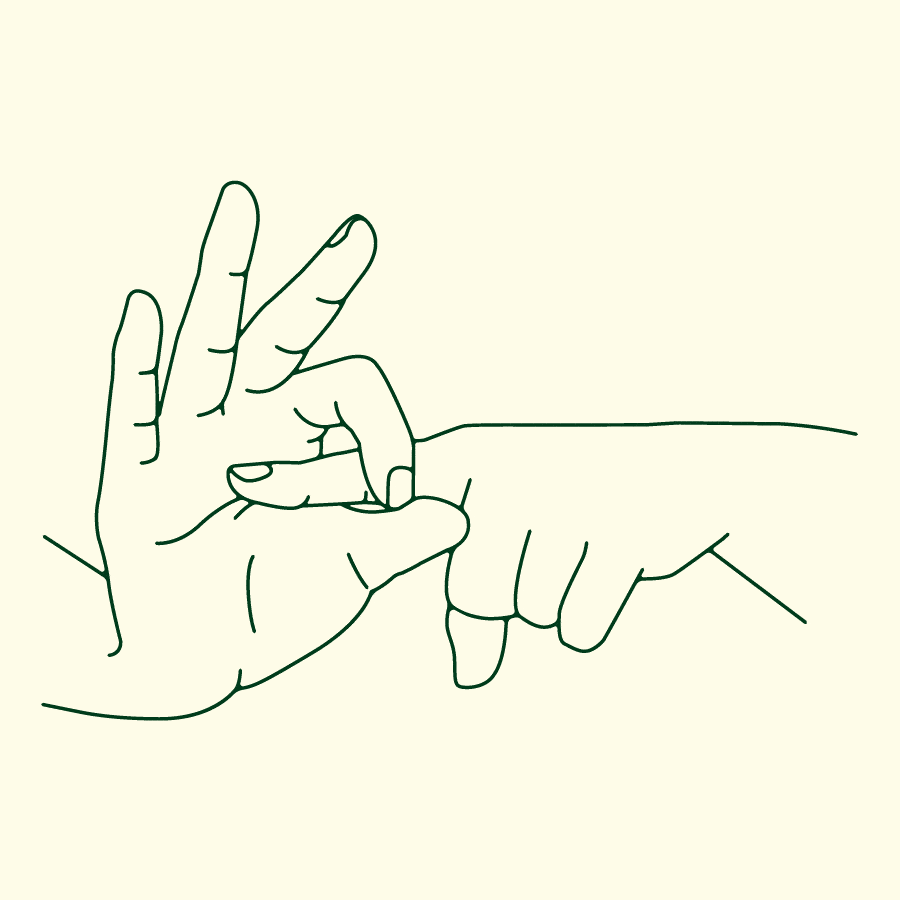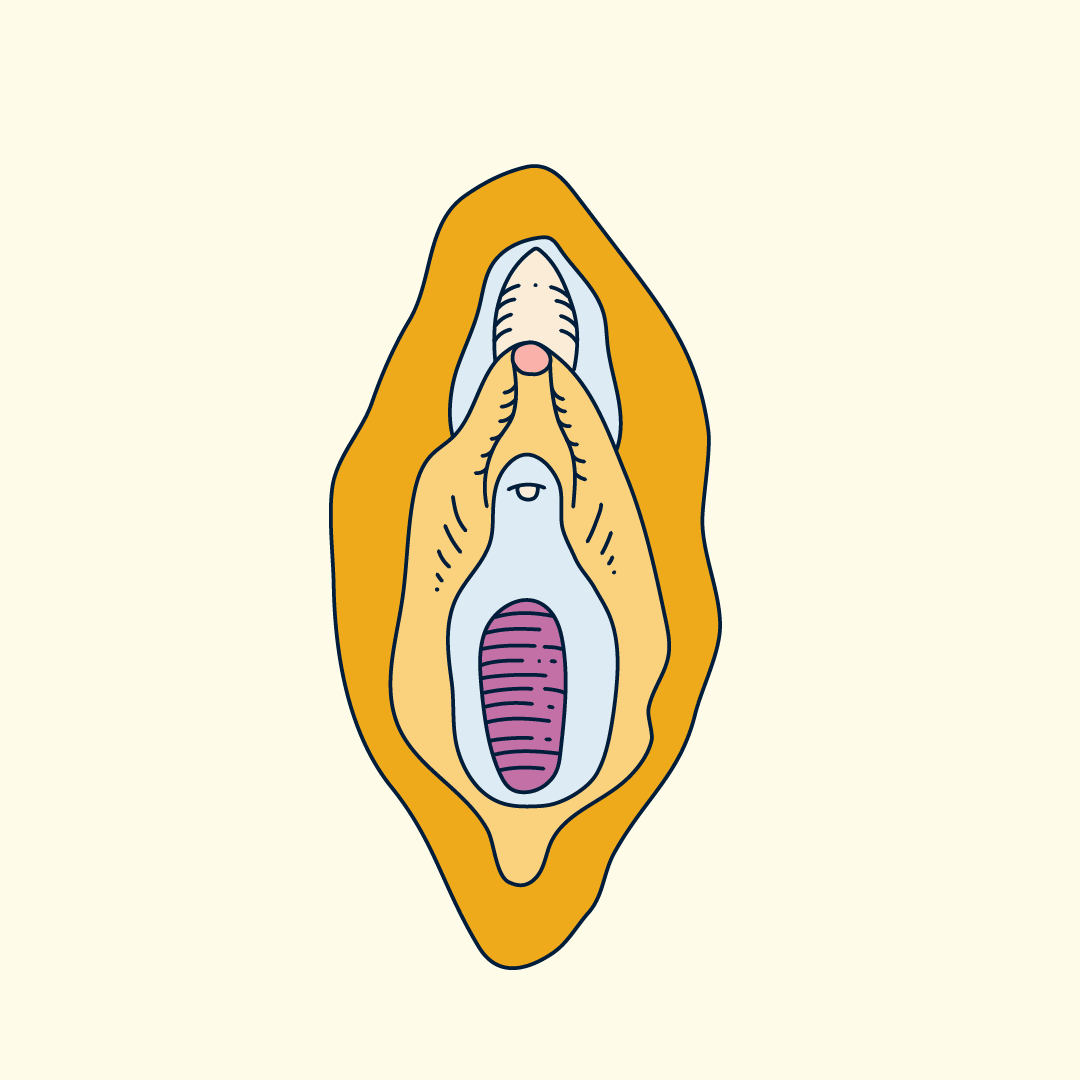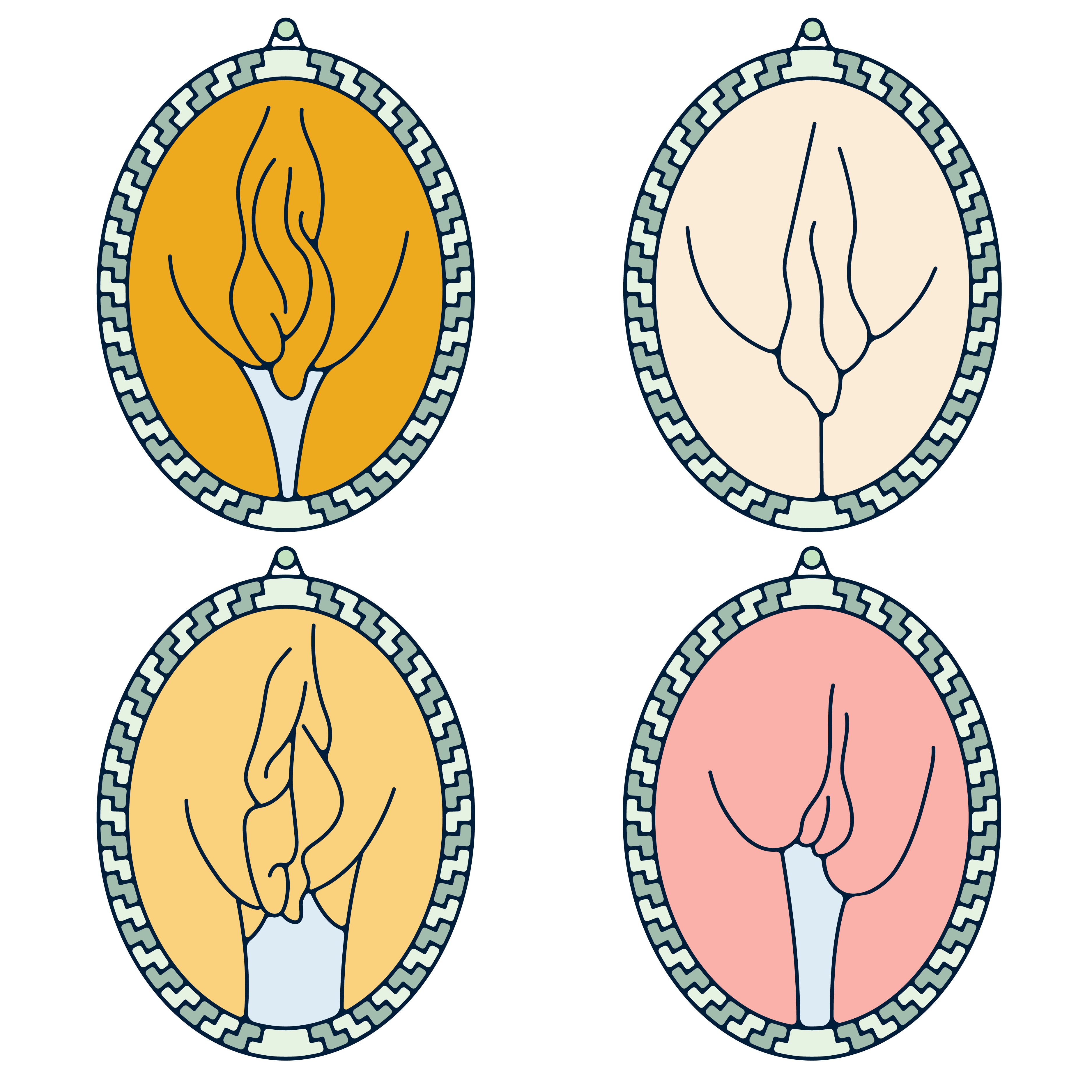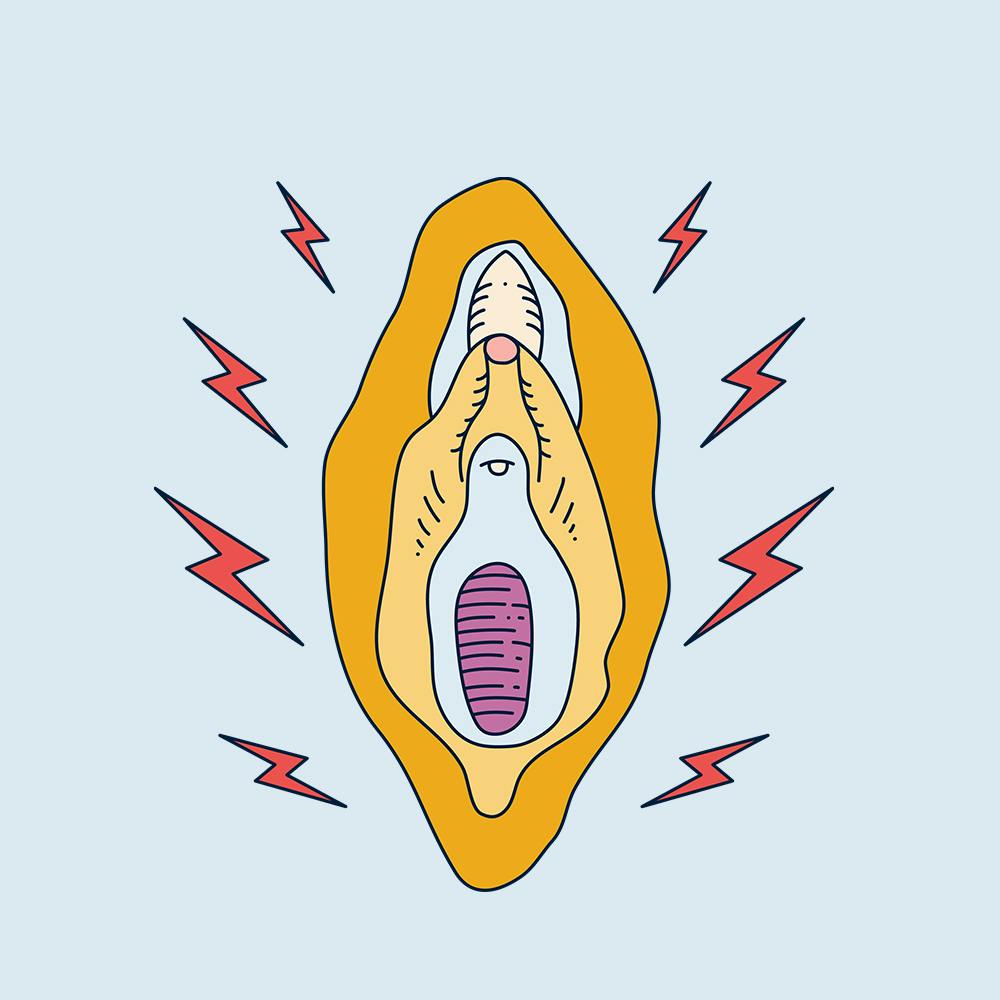Illustrated by Erin Rommel & Sabrina Bezerra
Vaginismus – an umbrella term used to describe the genito–pelvic pain caused by penetration – is one of the many female sexual health disorders that are under-researched and misunderstood.
It’s unclear how many women and AFAB individuals suffer from vaginismus, but it’s believed that around one in every 500 women and people with vaginas will experience the disorder at some point in their life.
What is vaginismus?
Vaginismus is a psychosexual condition that involves the involuntary tightening and spasming of the pelvic floor whenever penetration is attempted. Basically, it’s your body’s automatic reaction to the fear of penetration.
Whether it’s a tampon, finger, sex toy, penis or gynaecological exam tool, the vagina contracts and tightens to the point where nothing can penetrate it.
Vaginismus is also accompanied by physical pain, and people with vaginismus describe the pain as ranging from slight discomfort, to a stabbing or burning sensation in their vulva and vagina.
@the_sextivist, 22, says “it’s like a boiling hot knife is stabbing you across your pelvic floor and anything trying to get inside you has the potential to tear you in half.”
Vaginismus can be primary or secondary. Primary vaginismus is when the condition is present from a young age, before you even start having sex. People with primary vaginismus may realise they have it when trying to insert a tampon for the first time, or during their first gynaecological check-up.
Secondary vaginismus, on the other hand, is when a traumatic experience triggers the condition to appear later in life. Secondary vaginismus can appear at any stage in life, and may stem from a specific event or trauma, such as an acute infection, childbirth, relationship issues or sexual assault. The disorder is often linked to trauma, anxiety, depression or PTSD.

Vaginismus is a very complex condition and has a huge impact on a person’s quality of life. Intercourse becomes painful, if not impossible, which is made even worse by society’s obsession with penetrative sex (but that’s a conversation for another day).
It can also cause a huge amount of emotional distress, impacting someone’s mental health as well as physical health.
“I felt like quite a late developer compared to my peers I became anxious at the thought of sex,” says Liz Beardsell, 38.
“I thought it would be awkward navigating my way through how to have sex, I didn’t expect to experience any pain.” Liz started experiencing vaginismus at 20, and says that whenever her and her boyfriend would try to have penetrative sex, her body would tense up and she would start feeling sharp stabbing pains.
“I didn’t realise my body was reacting to a medical condition. I just thought I was nervous. It was two years later when I was talking to a friend about my problem that she suggested I may be suffering from vaginismus.” Liz walks through her 11 year journey with vaginismus in an episode of her podcast, titled Why Is My Vagina Stressed?.
Diagnosis for vaginismus
The stigma around vaginismus and the little reliable medical research means not only do we not know how many people suffer from this condition, but of those who do, diagnosis can be an uphill battle.

“Vaginismus is a psychosomatic condition, and although there are symptoms when penetration is attempted, the body and genitals appear unaffected,” says Dr. Kate Moyle, Psychosexual Therapist and host of The Sexual Wellness Sessions podcast.
“The challenge is because the muscular tension in the pelvic floor is a normal part of functioning, however the muscles are going beyond their normal way of working, and are more tense in certain situations preventing comfortable penetration.”
Dr. Moyle explains that education on vaginismus is often excluded from the curriculum for medical professionals, making it that much harder to diagnose.
“But also many women suffering with the condition feel unsure of how to describe their experiences and symptoms, which can also get in the way of diagnosis.”
“My diagnosis was a long time coming,” says Anna*, 27. “I was an adult (post uni) and it was maybe my 5th time [going] to the doctors about it. I always requested a female doctor to talk to. I felt like a female doctor may understand, empathise and give me proper help. However, they never did. They told me it was “normal” I couldn’t insert a tampon into my vagina, that it was because of my age.”

Painful intercourse – referred to medically as dyspareunia – seems to be commonplace for many women. Research shows that 30% of women report pain during vaginal sex. Some studies place that figure closer to one in 10 women.
“When my boyfriend at the time and I couldn’t have penetrative sex, I was told by my female doctor I need to “relax”, “persevere” and “most people’s first sexual experience is painful”,” explains Anna.
“I felt this is how everyone else felt, maybe women (or people with vaginas) were not meant to enjoy sex. I was gaslighted, and the shame that came from that is indescribable.”
Our culture has normalised female pain and sidelined female pleasure to the point where vaginismus sufferers think their pain is just a byproduct of having a vagina.
�“The first time I went to a GP about the pain I was experiencing she suggested I was sleeping with the wrong people and got told ‘a lot of the time young men don’t really know what they’re doing’,” explains @the_sexivist, who has primary vaginismus.
“Though I know the GP said this with good intentions I still felt like I hadn’t been heard. I kept going back and most of the time got told I had an STI, went to get tested, came back with negative test results and was told I should try getting tested again. Thankfully two GPs did take my pain seriously. I ended up having an ultrasound done just to check that the pain I felt during sex wasn’t linked to another issue like endometriosis, which wasn’t the case. After this, I was finally referred to a psychosexual therapist. The whole process took about a year.”

How do you treat vaginismus?
Although vaginismus is curable, societal stigma and lack of research means it can be very hard to find a treatment that works for each individual, as it’s a unique experience – rather than a one-size-fits-all scenario.
Vaginismus is a psychosomatic, meaning treatment is not as straightforward as that for thrush, or perhaps a cyst – it’s most often time consuming and multi-disciplinary.
Dr. Moyle recommends a treatment that focuses on both the physical and psychological and emotional components of the condition, such as psychosexual therapy.
“Women's health physio is also an excellent resource, as are websites like The Vaginismus Network which have advice from experts and women who are and have experienced this condition. Both mind and body play a big part in vaginismus, and so it's important to tackle both sides of the condition,” she says.
Aside from a form of therapy or counselling, treatment for vaginismus often involves drug treatments including antidepressants and anxiolytics, and physical treatments like pelvic floor physio or vaginal dilators (which gradually “stretch” the vagina to get used to penetration – like the ones Lily from Sex Education used). Sometimes, Botox is also used to relax the vaginal muscles and reduce painful spasms.
That being said, there isn’t concrete evidence that one method is necessarily better than another, so it can be a while before you find a treatment that works for you. Another shortcoming is that cuts to services tackling sexual dysfunctions in the UK means vaginismus sufferers are left without help.
“So many women I meet who have this condition struggle with the feelings of isolation that come with a condition like this,” says Dr. Moyle.
“It's also possible for women with this condition to have successful and happy relationships. A sex life is not all about intercourse and penetration, there are so many other ways to connect, experience pleasure and have fun sexual experiences.”
People with vaginas have a right to an enjoyable, satisfying sex life. More to the point, they have a right to be listened to by the medical community.
“Women feel shame about sex for some reason, especially if we struggle penetration,” says Anna. “All I want is for anyone with a vagina to know this is normal and treatable.”
*Names have been changed.






